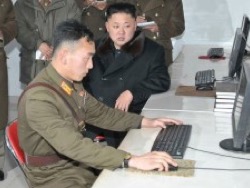
The April statement by the President of the ROK Park Geun-Hye of the Republic of Kazakhstan that in the near future will develop a programme to respond to the threat of cyber terrorism, forcing us again to pay attention to the theme of “North Korean hackers”, which in South Korea are traditionally blamed for any cyber attack or problems of compliance with safety regulations.
And although we may remember the recent scandal with Hillary Clinton, who used the unofficial “soap”, or the study of the American journalist F. Kaplan’s “the Dark land: the Secret history of cyberwar” (Dark Territory: The Secret History of Cyber War) that reveal some details of the attack on Sony Pictures Entertainment in 2014 (internal network of the company was protected with the simplest passwords 12345, ABCDE and password), let’s talk about what else were trying to attribute to hackers the DPRK and ROK in this fight.
The first big stuffing on hacker theme was in the fall when scouts told that in the beginning of October 2015 hackers North Korea tried to hack the computers of 30-40 deputies of the South Korean Parliament and their assistants, and employees of the presidential administration, the Ministry of defence, Ministry of foreign Affairs, the Ministry of unification. Special services of Kazakhstan have prevented (by their own statements) cyber attack, however, private electronic mailboxes of some deputies and their assistants were unprotected. Among the deputies who have cracked the head of the Committee for diplomacy and unification On Gene Vaughn. Stolen information related to regular parliamentary audits of state agencies and establish policies of Seoul against China. Did the hackers as usual with China, but the political smell scouts are always distinguished by Chinese hackers from North Korea. And really, why would Chinese hackers data about South Korean-Chinese relations?
But the public was told that the service of the DPRK are 58 000 hackers and trolls; 1,100 of them professional hackers are in China and Malaysia, earn per month up to 3000 dollars, but 2000 should be sent to the state Treasury, and the rest live and save money.
North Korea’s track showed up in the attack on the computers of employees of the Corporation “Seoul subway” in July 2015 — so said during a parliamentary audit, the Deputy from Ha Tae-Kyung of the ruling party of Senuri. Then it was discovered the unauthorized access on 213 computers and computers infected with a virus. Although the leak occurred within a few months, after discovering the attack, all 4 thousand working computers Corporation received additional protection. Now it turns out the identity of the methods of hacker attacks on the servers of the metro and previous objects. This is definitely the opening, whereby DDOS-attack is not a widespread hacker technique and exceptional method of military intelligence North Korea.
Malicious codes were found in the computers of leading South Korean defense companies, including ten computers of the Department on public relations of the leading companies of the defense sector “LIG Nex 1”. This company is engaged in the development of military equipment and weapons for a variety of areas, including advanced missiles and fighter jets. Military counterintelligence launched an investigation into the incident, and while it is known that codes have been listed with emails entitled in Korean as “About defence exhibition ADEX”. This exhibition recently held in and around Seoul, while South Korean manufacturers, including “LIG Nex 1”, took an active part. “We don’t know where he sent similar letters. We urged employees not to open any suspicious messages received by e-mail”, — noted in the defense Ministry.
February 19, 2016, the head of the parliamentary intelligence Committee, lawmaker Lee Cheol-Woo, “appointed” a new cyber attack in March-April: say, every time after some time after a nuclear test such attacks happen, and if so, then it is clear who organises them. Earlier that same week police announced that a huge array of spam to addresses of public organizations of the Republic of Kazakhstan send it North Korean hackers.
March 8, 2016, representatives of power ministries and departments held an emergency meeting in connection with the fact that the North Korean hackers made a cyber attack on the smart phones of high-ranking South Korean officials responsible for state security. According to the National intelligence service, in late February-early March of this year from the North was about 50 cyber-attacks. In ten cases, the hackers succeeded in injecting malicious code via text message. According to the representatives of the National intelligence service, the code contained a function that allows you to record voice messages and take possession of the files, hack text messages, record calls and phone book. The cyber attack has been one of South Korean companies for the creation and delivery of software for the security of Internet banking.
Warning in advance, and some defectors. Two such, who, as it turned out, had served in the cyber command of North Korea (no matter what it earlier does not pop up), said that most North Korean hackers are recruited from graduates of the Pyongyang University of science and technology opened in 2009 in the framework of inter-Korean cooperation. Moreover, other educational institutions of national defence or public security sent their students there for internship. Which means that this collaboration must stop immediately.
Pyongyang involvement in hacker attacks rejected. In an article published Sunday by the newspaper “Nodong” it said, the main printed organ of the ruling WPK put forward by Seoul called the accusations part of a broader propaganda campaign, “used for political purposes and is aimed at the aggravation of inter-Korean relations”.
However, the Committee of financial control of Kazakhstan still proceeded to check the security level of computer networks 16 banking and insurance companies. A number of financial organizations of Kazakhstan also took additional steps to strengthen cyber security: banks of URY and Shinhan created a special group for monitoring possible cyber-attacks and reinforced system of security checks. Control systems security decided to strengthen and other banks and companies engaged in the securities market.
Meanwhile, the opposition has periodically raised the question of illegal tapping of its members, and the operator of popular mobile messaging service KakaoTalk were forced to give prosecutors access to the messages exchanged between users and their databases. This decision was made a year later after prosecutors received the refusal in response to a request for access to communications suspected of committing crimes under the guise of violations of the privacy policy. Corporation managers Kakao feared that in case of transfer of office of public Prosecutor of the content of communication in a group chat that includes a suspect in a crime, will be violated the privacy of other participants. The Prosecutor’s office a condition, that the transmission of her message records of the suspect of other participants of the chat will remain anonymous. If users fear the disclosure of their personal information, they can choose “privacy settings” based on encryption technology. This message is only available on the specific smartphone user.
Note that this second attempt to access the messages after the scandal when it was revealed that the LDCs had tried to buy the software to be able to read the contents of correspondence via messenger KakaoTalk and listening to the conversations. After that, as they say, North Korea has banned South Korean smartphones.








